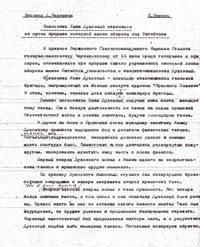Efim (Chaim) Dukhovnyi was born in 1912 in Ekaterinoslav (now Dnepropetrovsk, Ukraine). After graduating from school and a vocational school, he worked at a furniture factory in Leningrad. In 1932, after one year of study at a rabfak at one of Leningrad's institutes, he was sent to a military school for training armored forces in the city of Ulianovsk. After graduating in 1934 with the rank of junior lieutenant, he served as a tank commander in the Leningrad Military District. He later took part in the Finnish campaign, as commander of a tank battalion.
When Germany invaded the USSR on June 22, 1941, Captain Dukhovnyi was commander of an intelligence battalion of a tank division in Briansk. Already during the first months of the war he distinguished himself in battle when his tank engaged in combat with superior enemy forces.
Shmuel Persov described this combat in an article prepared for the Jewish Anti-fascist Committee:
"The fascist tanks advanced in a wide semi-circle, intending to surround our unit from both flanks. Dukhovnyi's first shell hit the turret of one of the enemy's tanks and this enemy weapon was silenced. Dukhovnyi gave the order for his tank turrets to fire continuously and soon another enemy tank was disabled.
But then his tank was hit by enemy fire. All four members of the crew, including the commander Dukhovnyi, were wounded. Nevertheless, not a single one of them abandoned his post. The tank was damaged but its weaponry was intact and continued to fire without pause. The fierce unequal combat lasted an hour and a half. The result was that Dukhovnyi put 5 tanks out of commission" (GARF 8114-1-95, copy YVA JM/26112).
In April 1942 Dukhovnyi was sent to Gorky (now Nizhnii Novgorod) to form a tank brigade. From August 1, 1942 this tank brigade under the command of Major Dukhovnyi took part in combat near Rzhev, the site of the heaviest fighting in summer of that year. Then it participated in the battle for Smolensk, the liberation of Belorussia, and the capture of Königsberg.
During the course of the war Dukhovnyi was awarded the Order of the Red Banner (twice), the Order of Kutuzov, 2nd class (also twice), and the Order of the Patriotic War, 1st class. He ended the war with the rank of colonel.
After the war, in 1953 he graduated as an external student from the Military Academy of Armored and Mechanized Forces and, in 1957, was promoted to major-general of tank forces. Dukhovnyi retired from the army on November 10, 1972.
He died in Nizhnii Novgorod in 2001.







